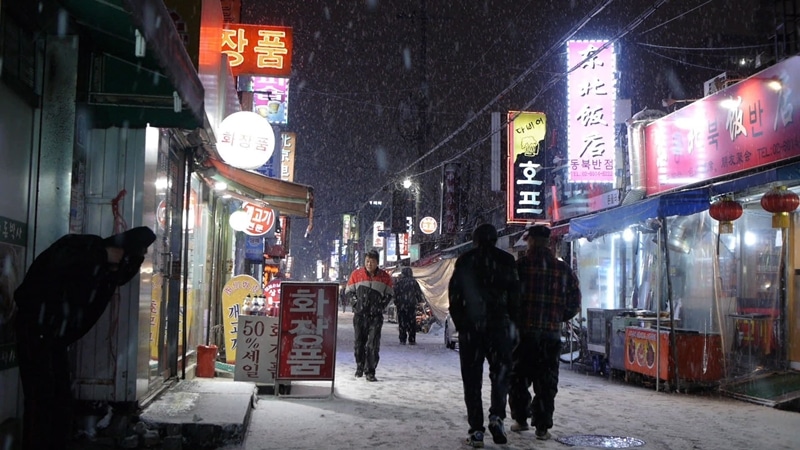Garibong
2013
Feature 6
PARK Kiyong | 2013 | Documentary| Color | DCP | 80min
SYNOPSIS
Garibong, located in Guro-gu, Seoul, is a place for outsiders. Garibong streets are filled with signs in Chinese, and loud Chinese and Korean-Chinese dialects are heard everywhere making you wonder just where you are. Garibong, now a Chinese-Korean town, was the residence for the 100,000 factory workers until early 1990s when the nearby Guro Industry Complex represented the Export Industrial Corporation of Korea. When the Guro Industry Complex was redeveloped into the Gasan Digital Complex in late 1990s, it resulted in an exodus of factory workers to other Korean cities or overseas. At this point, the Korean-Chinese filled the gap.
The Korean-Chinese are people from China who came to Korea to make money, just as the Guro Industry Complex factory workers arrived in Seoul from the countryside to make their fortune. Their migration to Korea, started in earnest in 1992 after the Korea-China amity pact was signed. This resulted in many success and failure stories: some bought several buildings back home with the big fortune made in Korea, while some are stuck here without any money for airfare to go home.
There is only one reason that Korean-Chinese rush into Garibong: the rent in Garibong is the lowest in Seoul. Only in Garibong can you find monthly rental rooms for KW 100,000. The so-called honeycomb that used to be filled with factory workers are now taken by Korean-Chinese, and the night street of Garibong once overflowing with after-work factory workers are now packed with Korean-Chinese drowning their troubles over a few drinks.
Garibong is the haven for Korean-Chinese. Here, there is no need for them to worry about the haughty Koreans. Nobody makes a scene with their mixture of Chinese and Korean-Chinese dialect and no one argues about their full table of local dishes from home. They can even swear at the unhelpful Korean government and the neglectful Koreans.
Many Korean-Chinese emphasize that they are Chinese people and their home is in China. This is because they are angry with the Korean government and Koreans who force them to wash dishes and do manual labor while ignoring the sacrifices they had to take coming to their ancestor’s home country. They only ask the Korean government and Koreans to treat them equally as Korean-Americans and Korean-Japanese. But Koreans still regard them as uneducated, distant relatives from the poor countryside who only freeload at their house. This pushes many Korean-Chinese to dream of returning to China as soon as they make enough money to open a restaurant or a shop in their hometown. Nonetheless, over one-quarter of the two million Korean-Chinese population are in Korea now, and Garibong is like a second home to them.
FESTIVAL & AWARDS
2013 제14회 전주국제영화제
2013 제32회 벤쿠버국제영화제
2013 중국항주아시아영화제
2013 중국시안국제영화제
DIRECTOR

PARK Kiyong
Motel Cactus (1997, 35mm, 95min)
Camel(s) (2001, digital, 93min)
Digital Search (2003, Digi-Beta, 30min)
Moving (2011, DCP, 94min)
STAFF
Director : PARK Kiyong
Producer : PARK Kiyong
Cinematography : PARK Kiyong
Editor : PARK Kiyong
